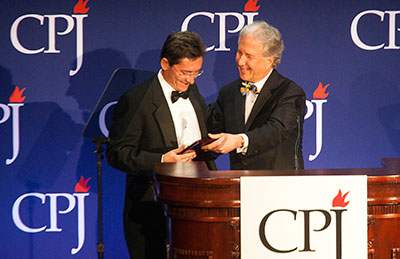New York, December 18, 2012–Brazilian authorities must immediately provide protection to journalist Mauri König, who went into hiding on Monday after receiving death threats related to his reports on police corruption, the Committee to Protect Journalists said today.
On Monday, the offices of the Curitiba daily Gazeta do Povo, where König is an investigative reporter, received several anonymous phone calls from people who warned that the journalist was at risk. Earlier that day, the newspaper had published a follow-up article by König and a team of journalists to a May report that revealed that local police officers were using their official vehicles for personal purposes, including going to the beach and visiting brothels. The same month, König and the team also exposed a scheme in which local law enforcement officers were diverting funds designated for police stations that were not in use or didn’t exist.
König told CPJ that he started receiving threats immediately after the reports were published in May, including anonymous comments on a blog frequented by police officers that classified him as “Public Enemy Number One.” König said the threats on Monday appeared to be more serious. In at least one of the phone calls, someone who identified himself as a police officer but would not give his name warned of a plot to kill König and said that several police officers from Rio de Janeiro had arrived in Curitiba and planned to shoot up his house. The journalist has gone into hiding with his family and spoke with CPJ from an undisclosed location.
This is not the first time that König, one of the country’s premier investigative journalists, has faced reprisal for reporting. While researching a series of articles on the recruitment and kidnapping of Brazilian children for military service in Paraguay in 2000, König was brutally beaten with chains, strangled, and left for dead near the Brazilian border, allegedly by three Paraguayan police officers. In 2003, he was forced to abandon his research along the Brazil, Paraguay, and Argentina border area after receiving threats from local police. Neither case was ever resolved. His extensive investigations, in which he has exposed human rights abuses and corruption, have brought him worldwide acclaim and numerous journalistic awards, including the 2012 CPJ International Press Freedom Award, which he accepted in New York in November.
“Mauri König has too often paid the price for his exceptional investigative reporting. Brazilian authorities are responsible for getting to the bottom of these threats, keeping König safe, and ensuring he can continue to report on issues of vital importance to the Brazilian public,” said Carlos Lauría, CPJ’s senior program coordinator for the Americas.
According to CPJ’s year-end analysis of journalists killed in the line of duty, published today, four Brazilian journalists have been killed in direct retaliation for their reporting in 2012, the highest number in the region. Of those four, three had reported on corruption. In a blog post that accompanied today’s report, König wrote of impunity in journalists murders in Brazil–a state of affairs that resulted in the country ranking 11th worst on CPJ’s Impunity Index, which calculates the number of unsolved journalist murders as a percentage of each country’s population.
“König’s case is emblematic of a troubling phenomenon in the nearly two years of Dilma Rousseff’s presidency, during which time murders of Brazilian journalists have reached a decade high. Even more worrisome is that most of these murders were in reprisal for reports on official corruption,” said Lauría. “President Rousseff cannot allow continued killing of journalists for reporting on the misdeeds of government and law enforcement agencies. We call on the president to ensure the safety of the press and to work to combat the pervasive impunity in past journalists’ murders.”
